新概念第一册49课单词导入
- 格式:pptx
- 大小:1.35 MB
- 文档页数:9
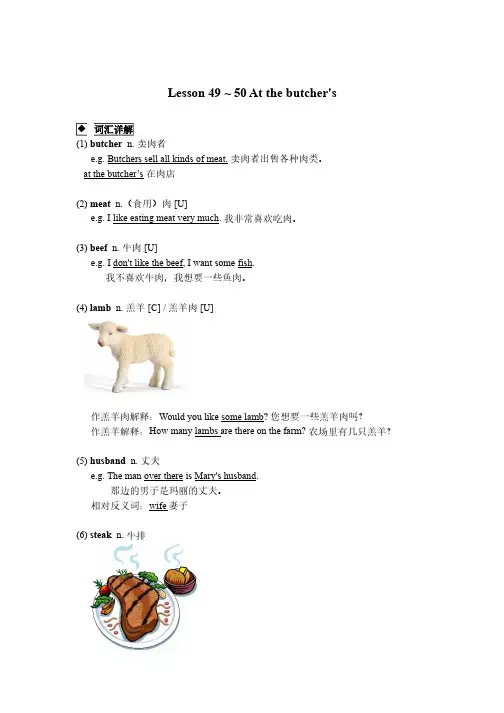
Lesson 49 ~ 50 At the butcher's(1) butcher n. 卖肉者e.g. Butchers sell all kinds of meat. 卖肉者出售各种肉类。
at the butcher’s 在肉店(2) meat n.(食用)肉 [U]e.g. I like eating meat very much. 我非常喜欢吃肉。
(3) beef n. 牛肉 [U]e.g. I don 't like the beef, I want some fish.我不喜欢牛肉,我想要一些鱼肉。
(4) lamb n. 羔羊 [C] / 羔羊肉 [U]作羔羊肉解释:Would you like some lamb? 您想要一些羔羊肉吗?作羔羊解释:How many lambs are there on the farm? 农场里有几只羔羊?(5) husband n. 丈夫e.g. The man over there is Mary's husband.那边的男子是玛丽的丈夫。
相对反义词:wife 妻子(6) steak n. 牛排e.g. I’d like to order a steak, please. 我想点一份牛排。
衍生:除牛排外,也可解释为肉排、鱼排(7) chicken n. 鸡 [C] / 鸡肉 [U]作鸡肉解释:I want some chicken, please. 我想买一些鸡肉。
作鸡解释:There are six chickens inside the fence. 栅栏内有六只鸡。
(8) tell v. 告诉e.g. My mother always tells me a story before I go to sleep.我妈妈总是在我睡前给我讲一个故事。
常用搭配:tell a story 讲故事 tell a lie 说谎【学生版不出现】试比较:say 说(后面通常紧跟说的内容)如:He says, ―it‘s a beautiful day. 他说,今天是个好天气。
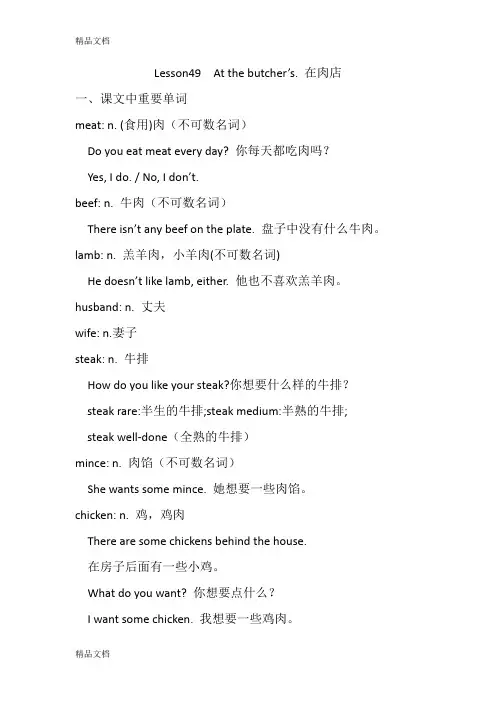
Lesson49 At the butcher’s. 在肉店一、课文中重要单词meat: n. (食用)肉(不可数名词)Do you eat meat every day? 你每天都吃肉吗?Yes, I do. / No, I don’t.beef: n. 牛肉(不可数名词)There isn’t any beef on the plate. 盘子中没有什么牛肉。
lamb: n. 羔羊肉,小羊肉(不可数名词)He doesn’t like lamb, either. 他也不喜欢羔羊肉。
husband: n. 丈夫wife: n.妻子steak: n. 牛排How do you like your steak?你想要什么样的牛排?steak rare:半生的牛排;steak medium:半熟的牛排; steak well-done(全熟的牛排)mince: n. 肉馅(不可数名词)She wants some mince. 她想要一些肉馅。
chicken: n. 鸡,鸡肉There are some chickens behind the house.在房子后面有一些小鸡。
What do you want? 你想要点什么?I want some chicken. 我想要一些鸡肉。
tell: v. 告诉:掌握与tell相关的几个词的用法:speak + 语言:speak Chinese 说汉语/ speak English 说英语/ speak French 说法语talk: 谈话,交谈I want to talk to you. 我想和你谈一谈。
Say: 说(强调说的内容)He always says that he is a good man.他总是说他是一个好男人。
truth: n. 实情,真相; tell the truth 说实话,告诉真相;find out the truth 找到真相;either: adv. 也(用于否定句)too用于肯定句和疑问句中。
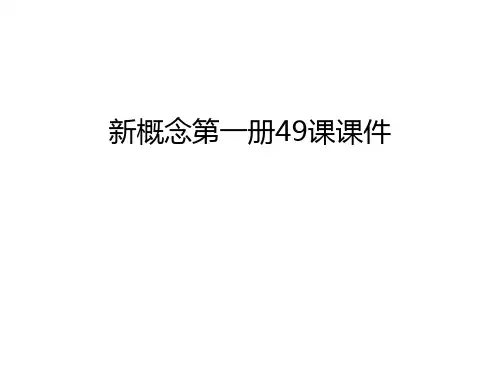

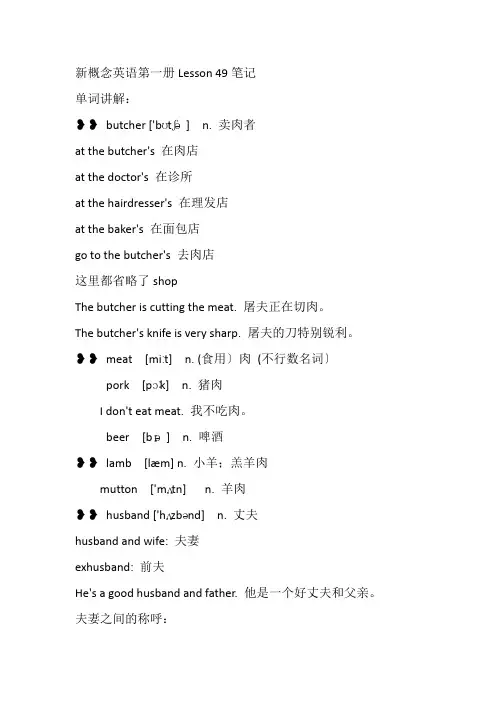
新概念英语第一册Lesson 49笔记单词讲解:❥❥butcher ['bʊtʃə] n. 卖肉者at the butcher's 在肉店at the doctor's 在诊所at the hairdresser's 在理发店at the baker's 在面包店go to the butcher's 去肉店这里都省略了shopThe butcher is cutting the meat. 屠夫正在切肉。
The butcher's knife is very sharp. 屠夫的刀特别锐利。
❥❥meat [miːt] n. (食用〕肉(不行数名词〕pork [pɔːk] n. 猪肉I don't eat meat. 我不吃肉。
beer [bɪə] n. 啤酒❥❥lamb [læm] n. 小羊;羔羊肉mutton ['mʌtn] n. 羊肉❥❥husband ['hʌzbənd] n. 丈夫husband and wife: 夫妻exhusband: 前夫He's a good husband and father. 他是一个好丈夫和父亲。
夫妻之间的称呼:honey dear darling baby sweetheart❥❥steak [steɪk] n. 牛排a piece of steak 一块牛排How do you like your steak?你想怎样吃你的牛排?Steak rare/medium/welldone.生些/五分熟/全熟。
❥❥mince [mɪns] n. 肉馅I want a pound of mince, because I want to make some dumplings. 我想要一磅肉末,由于我想做一些饺子。
❥❥chicken ['tʃɪkɪn] n.鸡;鸡肉hen [hen] n. 母鸡cock [kɒk] n. 公鸡❥❥tell [tel] v. 告知tell sb. sth. 告知某人某件事tell the truth: 说实话tell a story: 讲故事tell a joke: 讲笑话She's telling a story to the children. 她正在给孩子们讲故事。
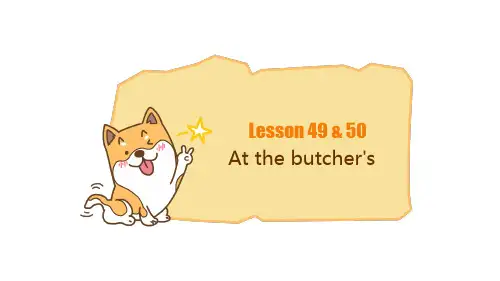
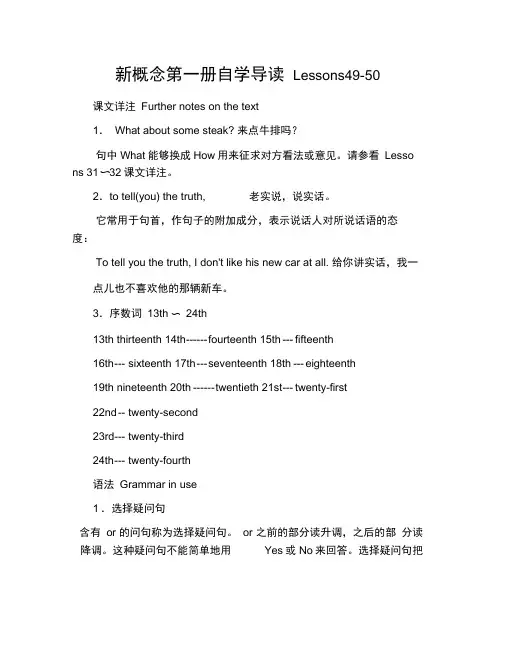
新概念第一册自学导读Lessons49-50 课文详注Further notes on the text1.What about some steak? 来点牛排吗?句中What能够换成How用来征求对方看法或意见。
请参看Lesso ns 31〜32课文详注。
2.to tell(you) the truth, 老实说,说实话。
它常用于句首,作句子的附加成分,表示说话人对所说话语的态度:To tell you the truth, I don't like his new car at all. 给你讲实话,我一点儿也不喜欢他的那辆新车。
3.序数词13th 〜24th13th thirteenth 14th ------ f ourteenth 15th --- fifteenth16th --- sixteenth 17th --- s eventeenth 18th --- eighteenth19th nineteenth 20th ------ t wentieth 21st --- twenty-first22nd -- twenty-second23rd --- twenty-third24th --- twenty-fourth语法Grammar in use1 .选择疑问句含有or 的问句称为选择疑问句。
or 之前的部分读升调,之后的部分读降调。
这种疑问句不能简单地用Yes或No来回答。
选择疑问句把选择的余地缩小在数目有限的事物、行动等上面,能够有无限性的选择、3项选择以及两项选择。
选择疑问句通常能够采用缩略形式,如:Beef or lamb? 牛肉还是羔羊肉?选择疑问句的例句如:What would you like to drink? 你喜欢喝什么?(无限性选择)Which/What would you prefer, tea or coffee? 茶和咖啡,你喜欢哪一种?(两项选择)Would you like tea, coffee, or milk? 你喜欢茶、咖啡、还是牛奶?(3 项选择)How shall we go, by bus or by train? 我们怎么走?乘公共汽车还是坐火车?Did you go there, or didn't you? 你去了那儿还是没有去?Did you or didn't you go there? 你是去了还是没有去那儿?2.一般现在时的单数第 3 人称形式(可参见Lessons 47 ~ 48语法部分。

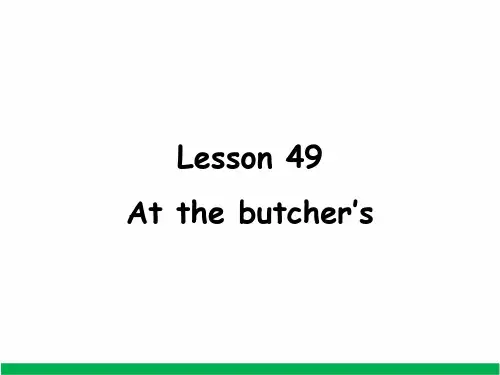


Lesson49BUTCHER: Do you want any meat today. Mrs. Bird? MRS.BIRD: Yes, please.BUTCHER: Do you want beef or lamb?MRS.BIRD: Beef, please.BUTCHER: This lamb's very good.MRS.BIRD: I like lamb, but my husband doesn't. BUTCHER: What about some steak?This is a nice piece.MRS.BIRD: Give me that piece, please.MRS.BIRD: And a pound of mince, too. BUTCHER: Do you want a chicken, Mrs. Bird?They 're very nice.MRS.BIRD: No, thank you.MRS.BIRD: My husband likes steak,but he doesn't like chicken. BUTCHER: To tell you the truth, Mrs. Bird,I don't like chicken either! 肉商:您今天要买点肉吗,伯德夫人?伯德夫人:是的,我买一点。
肉商:您要牛肉还是要羔羊肉?伯德夫人:请给我牛肉。
肉商:这羔羊肉很好。
伯德夫人:我喜欢羔羊肉,可我丈夫不喜欢。
肉商:来点牛排吗?这块很好。
伯德夫人:就请给我那块吧。
伯德夫人:再来一磅绞肉。
肉商:您要买只鸡吗,伯德夫人?这些鸡很好。
伯德夫人:不要了,谢谢。
伯德夫人:我丈夫喜欢牛排,但他不喜欢鸡。
肉商:说老实话,伯德夫人,我也不喜欢鸡。
【知识点讲解】1. Do you like... 意思是“你喜欢XX吗?”;Do you want...意思是“你想要XX吗?”所以文中第一句Do you want any meat today? 翻译为:你今天想要(买)点肉吗?2. beef or lamb,or表示选择,牛肉还是羊肉呢?3. 还记得我们之前学过第三人称单数后面的现在时态的动词要加S吗?所以表示“他喜欢牛排”应该说成:He likes steak. 如果要表示他不喜欢,则要用"doesn't"这个字:He doesn't like steak.把几种人称变化的表达形式列在下面:I like it. -- I don't like it.You like it. -- You don't like it.He/She likes it. -- He/She doesn't like it.We like it. -- We don't like it.They like it. -- They don't like it.4. a piece of, 这个量词可以用来修饰“牛排”,翻译成“一片、一块牛排”。